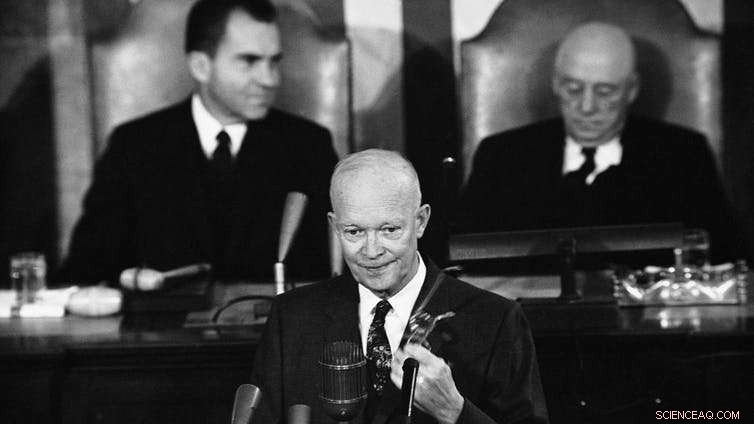
Il presidente Eisenhower si rivolge a una sessione congiunta del Congresso nel 1958. Dietro il presidente ci sono il vicepresidente Richard Nixon, sinistra, e presidente della Camera Sam Rayburn, Giusto. Credito:NASA
Spazio, quell'ultima frontiera, è qualcosa che cattura l'attenzione di un paese naturalmente incline a credere in idee come "Manifest Destiny" e l'eccezionalismo americano. Ma quanto bene una Space Force si adatta a questo progetto? E una Space Force riaccenderebbe una corsa spaziale militare e alimenterebbe le tensioni diplomatiche con Cina e Russia?
Cresciuto in Florida, Ho avuto la fortuna di guardare i lanci dello space shuttle con qualcosa che assomigliava alla regolarità. Quando sono cresciuto e ho appreso per la prima volta la storia della NASA, i suoi exploit durante la Space Race e poi le sue sfide, Non ho mai perso il senso di meraviglia per ciò che la NASA poteva fare. Ho anche guadagnato un apprezzamento per le difficoltà che ha dovuto superare per raggiungere quei risultati. Ho trasformato questo interesse in una carriera accademica studiando la politica dello spazio, scienza e medicina.
L'influenza della NASA è chiaramente visibile in questi altri campi così come nella nostra vita quotidiana. Le tecnologie sviluppate per consentire l'esplorazione dello spazio hanno portato a tali innovazioni per i consumatori come lenti antigraffio e scansioni CAT. I nostri cellulari non sarebbero possibili senza la miniaturizzazione dei chip durante il programma Apollo o dei satelliti GPS militari. Dati questi vantaggi, spesso dimentichiamo la natura difficile del volo spaziale e le risorse necessarie per realizzarlo.
Infatti, esaminare le esperienze e le lezioni politiche della NASA rivela le difficoltà di istituire una nuova agenzia governativa e lanciare un'organizzazione il cui compito è fare cose difficili a un costo elevato. Guardare gli alti e bassi della storia della NASA ci mostra che ci sono potenziali benefici a livello nazionale, ma che potrebbero comportare un rischio internazionale maggiore.
Cos'è una forza spaziale, e comunque cosa farebbe?
Durante una manifestazione nel marzo di quest'anno, Il presidente Donald Trump ha menzionato per la prima volta l'idea di una forza spaziale. Da allora, il presidente ha twittato sull'idea e ha ordinato al Pentagono di sviluppare un piano per creare un sesto ramo indipendente dell'esercito. Rispondendo alle direttive del presidente, il Pentagono ha pubblicato un rapporto ad agosto. Sebbene il rapporto fosse etichettato come "finale, " le sue 15 pagine sono scarse di dettagli, a lungo sui punti di discussione, e luce sui dettagli sul perché ci deve essere una Space Force.
La Casa Bianca e il Congresso stanno valutando l'idea da tempo. Durante il dibattito sulla legge di autorizzazione alla difesa nazionale 2017, i membri della Commissione per i servizi armati della Camera hanno inserito una disposizione che istituisce un "Corpo spaziale". Il proposto Space Corps doveva essere ospitato all'interno dell'Air Force, ma la disposizione è stata successivamente rimossa durante i negoziati Camera-Senato a causa delle obiezioni sia della Casa Bianca che del Segretario alla Difesa James Mattis. Anche se ora ha espresso sostegno per una Space Force, Mattis all'inizio si era opposto per problemi di budget e spese generali.
L'attenzione allo spazio era evidente anche nella Strategia per la sicurezza nazionale pubblicata a dicembre 2017 e nella Strategia spaziale nazionale pubblicata a marzo.
Al di là di tweet e menzioni, la Casa Bianca no, secondo me, fatto un caso convincente per il motivo per cui una tale forza è necessaria. Il rapporto del Pentagono, che presumibilmente pone le sue basi, afferma che "potenziali avversari stanno ora sviluppando attivamente modi per negare il nostro uso dello spazio in una crisi. È imperativo che gli Stati Uniti adattino le loro politiche, dottrina e capacità per proteggere i nostri interessi".
Le radici militari dell'esplorazione spaziale e le prime lezioni della NASA
Dire che esercito e spazio sono intrecciati è un eufemismo. I satelliti forniscono comunicazioni civili ma fanno lo stesso anche per le unità militari. Gli analisti spaziali chiamano questo "doppio uso" ed è anche ciò che rende così difficile separare pacificamente, attività civili da quelle militari.

New York City dà il benvenuto all'equipaggio dell'Apollo 11 in una parata di nastri ticker lungo Broadway e Park Avenue. Nella foto nella macchina di testa, da destra, sono gli astronauti Neil A. Armstrong, Michael Collins e Buzz Aldrin. I tre astronauti si sono uniti per il primo sbarco lunare con equipaggio, il 20 luglio, 1969. Credito:NASA
Le radici militari e civili dell'esplorazione spaziale sono strettamente legate l'una all'altra. Quando l'Unione Sovietica lanciò lo Sputnik nell'ottobre del 1957, it set off a panic in the United States about the capability not of the Soviets to explore space, but about their ability to launch deadly attacks on Americans. Così, the Space Race was born not out of a desire to peacefully explore space, but Cold War politics.
President Dwight Eisenhower, careful not to read too much into the Soviet abilities, was cautious in responding to the threat. Although Eisenhower initially wanted the space effort to be run by the military, he was persuaded to create a more open, civilian space program in part to lessen "attention on U.S. national security space efforts." Legislation creating NASA was passed in 1958 with NASA opening its doors Oct. 1 of that year.
There are two lessons to be taken from NASA's establishment and early history. First, it was an agency born of a crisis. The United States was seemingly falling behind its Cold War adversary and the public demanded that the government respond. Crisis often precedes the establishment of new government agencies and provides those agencies with a base of public and political support.
In terms of a Space Force, there is no apparent crisis. We know that both Russia and China have been developing military capabilities in space. China first tested an anti-satellite weapon in 2007 and more recently, Russian satellites have been demonstrating new capabilities. There are most likely other military activities in these states, and perhaps others, they have undertaken that remain classified. If this is the case, then I believe the administration needs to lay a stronger foundation for why a Space Force is needed because lacking a crisis, support is often hard to come by.
A second, and related, lesson is in terms of public support. Although Americans tend to remember the space programs of the 1960s favorably, public support for NASA began to fall in the early 1960s and as Roger Launius, a NASA historian, writes, the data "do not support a contention that most people approved of Apollo and thought it important to explore space." Along with this came a drop in funding that left NASA scrambling in the late 1960s to accomplish Kennedy's goal of landing a man on the moon by the end of the decade. Studies of public opinion often demonstrate a "thermostatic" relationship between public opinion and funding.
For the Space Force, public opinion is upside down. In recent polls, CNN found that 55 percent of Americans do not support the establishment of a Space Force while Rasmussen (typically a Republican-leaning poll) found that 40 percent of Americans are opposed, while 27 percent were unsure. If support and funding go hand in hand, these findings do not put the Space Force on a sustainable footing.
Consequences of a Space Force for NASA and militarization of space
Should the Trump administration succeed in establishing a Space Force or something like it, the move may have serious consequences for NASA. Depending on its mission, the Space Force is likely to require launch capabilities for satellites and perhaps human missions. Although a Space Force may be able to purchase these services from companies like SpaceX, if they choose to develop an in-house launch system, they may duplicate already existing NASA efforts. Doing so would also likely cause a brain drain at NASA as in-house engineers and experts migrated to the Space Force with promises of new missions and new funding.
There is also a question of whether the Space Force may simply take over current NASA missions. In the wake of the Space Force announcement, the Trump campaign sent out an email to supporters asking them to vote on a potential logo. Although this was a fundraising maneuver, one of the "logos" was themed around Mars with the wording "Mars Awaits." Given that the overall mission of the Space Force remains unclear, there could be a push for human spaceflight efforts to be subsumed under a Space Force. NASA's recent failures in the development of the Space Launch System, or SLS, and the James Webb Space Telescope only further reinforce the image of a NASA spread too thin to accomplish major space endeavors.
Finalmente, NASA's budget is already quite low considering its mission:US$19.7 billion in 2017 with $19 billion requested for 2018. This represents less than 0.5 percent of the overall federal budget. A Space Force could feasibly take away funding from NASA, especially for the development of human spaceflight capabilities thus cannibalizing NASA's already low budget.
In terms of geopolitics, establishing a Space Force could create a point of no return in of militarization of space. From Eisenhower onwards, U.S. policymakers have avoided the appearance of overt military influence in space. Both the United States and the Soviet Union joined the 1967 Outer Space Treaty, which stipulated, among other things, the peaceful use of outer space and a ban on nuclear weapons. Following the Space Force announcement, Russian officials warned about potential violations of the treaty and that Russia might choose to withdraw from the treaty if the U.S. did.
Joan Johnson-Freese, a space policy expert, warns in her recent book that the pace of American militarization of space has been increasing, perhaps to the point of no return. Her warning is that policymakers think about further actions before stepping into an arms race for which no one is prepared. While President Trump has certainly shaken up America's relations with other countries, such a drastic change in American posture could have significant and irreversible effects, creating a second space race. While it could have benefits for American society much as the original space race did, this time, I believe the dangers are likely to be far higher.
Questo articolo è stato ripubblicato da The Conversation con una licenza Creative Commons. Leggi l'articolo originale. 